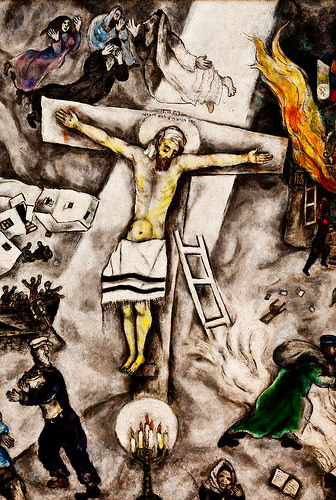We run our website the way we wished the whole internet worked: we provide high quality original content with no ads. We are funded solely by your direct support. Please consider supporting this project.
The Cross Above All Else
The way to know what a person or people group really believes is not to ask them but to watch them. Christians frequently say, “It’s all about Jesus,” but our actions betray us. Judging by the amount of time, energy, and emotion that many put into fighting a multitude of battles, ranging from the defense of the literalness and inerrancy of the Bible to war against gay marriage or universal health care, one easily gets the impression that Christianity is about a lot of different, equally important, things.
This unfortunately sends the message to the broader culture that becoming a follower of Jesus requires a person to embrace all of this. …
Strip away all the clutter, and what is left is simply the cross, where God reveals his true character and invites us to be transformed into his likeness through the power of his love. We trust that our fallen and self-oriented character will be transformed into God’s cruciform character. That is the kingdom, pure and simple.
The central significance of the cross is reflected in the fact that the sign of our covenant relationship with Christ is communion. When we look to the cross, we see the heavenly bridegroom wooing us, as his prospective spouse, by opening up his heart and revealing his true character. On the cross we see the heavenly bridegroom demonstrating his perfect love for his prospective bride—all of humanity—even while she had assumed the posture of an enemy toward him (Rom. 5:10). On the cross we see the heavenly bridegroom paying the required dowry to acquire his bride and to free us from our self-inflicted bondage to sin and to the powers of darkness. And on the cross we see the heavenly bridegroom imploring every human being to accept his marriage proposal and to become his bride who is making “herself ready” for his return, when the wedding supper of the lamb will be celebrated and she shall begin her eternal reign with him (Rev 19:7-9).
We say “yes” to this proposal when we exercise faith, which is why Paul says we are saved and reconciled to God through faith (e.g. Rom. 3:22018; Eph 2:8). Faith involves trusting God to be faithful in his relationship with us as well as pledging ourselves to be faithful in our relationship with God. And the cross defines what that covenantal faithfulness looks like for both God and us. By taking the bread and the cup in fellowship with others, therefore, we are reminded of the love and faithfulness God demonstrated and pledged toward us on the cross, and we are reminded of our call to imitate the love and faithfulness to God and our neighbor that was modeled for us on the cross.
One of the most remarkable expressions of the all-encompassing nature of the cross is reflected in an incidental, but extremely important, comment that Paul made in the First Letter to the Corinthians. He noted that when he brought “the testimony of God” to Corinth, he hadn’t come “with eloquence of human wisdom.” He instead “resolved to know nothing … except Jesus Christ and him crucified” (1 Cor. 2:1-2). …
Everything we are to trust God for is found in the cross. We are not involved in a contract that would require us, or even just allow us, to comb the Bible to latch onto this or that particular passage as a kind of insurance policy that God will come through for us. We are rather in a covenant in which it is not particular things we trust God for; our trust is rather in God himself. … We trust God to be who he reveals himself to be on the cross and trust that his moment-by-moment attitude toward us is what he reveals it to be on the cross.
This excerpt is from Benefit of the Doubt, pages 231-234.
Category: General
Tags: Benefit of the Doubt, Communion, Cruciform Theology, Faith, Jesus
Related Reading

What To Do With the Violent God of the Old Testament
For eight years Greg has been researching for and writing the book entitled The Crucifixion of the Warrior God. In it he confronts the commonly held idea that the Old Testament depictions of God behaving violently should be held alongside of and equal to the God revealed through Jesus dying on the cross. But if the Old Testament…

What Are the “Keys to the Kingdom”?
And I tell you that you are Peter [petros = rock], and on this rock I will build my church, and the gates of Hades will not overcome it. I will give you the keys of the kingdom of heaven; whatever you bind on earth will be bound in heaven, and whatever you loose on…

Christ the Center
The center of the Christian faith is not anything we believe; it’s the person of Jesus Christ. The foundation of my faith is a person, not a book and a set of beliefs about that book. Rather than believing in Jesus because I believe the Bible to be the inspired Word of God, I came…

Don’t all religions believe in the same God?
http://youtu.be/BKmSr6lKWsk Bruxy Cavey takes a swing at this question and scores a home run.

God is Like a Trojan Horse
Yesterday, I introduced a basic understanding of the Christus Victor view of Christ’s work on the cross. [Click here to read it.] Today, I want to expand on this briefly. Because God is a God of love who gives genuine “say-so” to both angels and humans, God rarely accomplishes his providential plans through coercion. God…

What Happened on the Cross?
Since the time of Anselm (11th century), and especially since the Reformation in the 16th century, the tendency of the Western church has been to focus almost all of its attention on the anthropological dimension of the atonement, usually to the neglect of the cosmic dimension that is central to the NT. In the standard…

